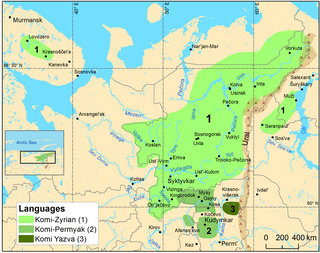
Back Акоми бызшәа Abkhazian Komi Afrikaans Komi (Sprache) ALS اللغة الكومية Arabic الكوميه ARZ Idioma komi AST Komi dili Azerbaijani کومی دیلی AZB Коми теле Bashkir Kuomiu kalba BAT-SMG
| Komi-Zyrian | |
|---|---|
| коми кыв komi kyv | |
| Native to | Russia |
| Region | Komi Republic, Nenetsia, Permyakia, Yamalia, elsewhere in Russia |
Native speakers | 99,609 (2020 census)[1] |
| Cyrillic, Old Permic (formerly) | |
| Official status | |
Official language in | |
| Language codes | |
| ISO 639-3 | kpv |
| Glottolog | komi1268 |
 | |
 | |
Komi (коми кыв, komi kyv), also known as Zyran, Zyrian or Komi-Zyryan (зыран коми кыв, zyran komi kyv),[5] is the native language of the Komi (Zyrians). It is one of the Permian languages; the other regional variety is Komi-Permyak.[6]
Komi is spoken in the Komi Republic and other parts of Russia such as Nenetsia and Yamalia. There were 285,000 speakers in 1994, which decreased to 160,000 in 2010.
It was formerly written in the Old Permic script created by Stephen of Perm for liturgical purposes in the 14th century, though very few texts exist in this script. The Cyrillic script was introduced by Russian missionaries in the 17th century, replacing it. A tradition of secular works of literature in the modern form of the language dates back to the 19th century.
- ^ "Росстат — Всероссийская перепись населения 2020". rosstat.gov.ru. Retrieved 2023-01-03.
- ^ Rantanen, Timo; Tolvanen, Harri; Roose, Meeli; Ylikoski, Jussi; Vesakoski, Outi (2022-06-08). "Best practices for spatial language data harmonization, sharing and map creation—A case study of Uralic". PLOS ONE. 17 (6): e0269648. Bibcode:2022PLoSO..1769648R. doi:10.1371/journal.pone.0269648. PMC 9176854. PMID 35675367.
- ^ Rantanen, Timo, Vesakoski, Outi, Ylikoski, Jussi, & Tolvanen, Harri. (2021). Geographical database of the Uralic languages (v1.0) [Data set]. Zenodo. https://doi.org/10.5281/zenodo.4784188
- ^ "Komi in Russian Federation". UNESCO WAL. Retrieved 22 June 2024.
- ^ "Komi language". Encyclopædia Britannica..
- ^ Riese 2015, pp. 249–250.
© MMXXIII Rich X Search. We shall prevail. All rights reserved. Rich X Search